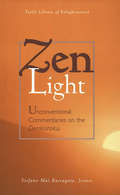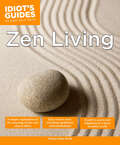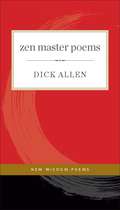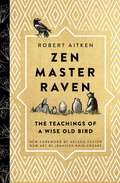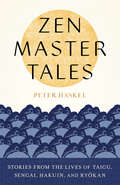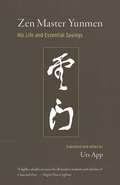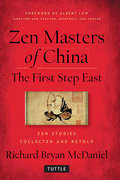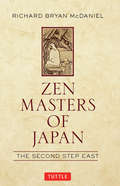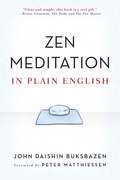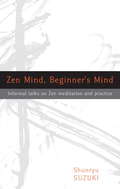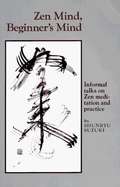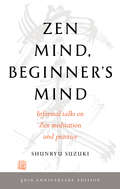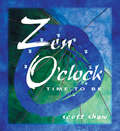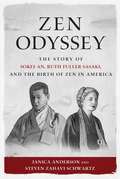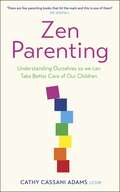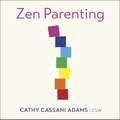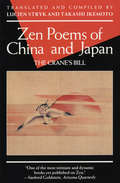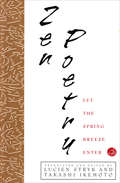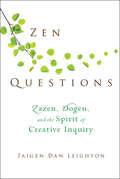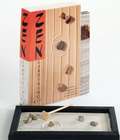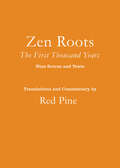- Table View
- List View
Zen Light
by Stefano Mui BarragatoThe Denkoroku, or "Record of Transmitting the Light," contains the enlightenment stories of the earliest Zen ancestors. In Zen Ught, the author comments on this Buddhist classic, which he studied as part of his own advanced Zen training. Sensei Barragato brings the varied experiences of his life and his studies in Catholicism and Quaker practice to the teachings of Zen Buddhism, making these commentaries at once off-beat, refreshing, and revealing. He touches on the major issues that affect our lives, making thisbook of interest to both the beginning as well as the advanced student of Zen.
Zen Light
by Stefano Mui BarragatoThe Denkoroku, or "Record of Transmitting the Light," contains the enlightenment stories of the earliest Zen ancestors. In Zen Ught, the author comments on this Buddhist classic, which he studied as part of his own advanced Zen training. Sensei Barragato brings the varied experiences of his life and his studies in Catholicism and Quaker practice to the teachings of Zen Buddhism, making these commentaries at once off-beat, refreshing, and revealing. He touches on the major issues that affect our lives, making thisbook of interest to both the beginning as well as the advanced student of Zen.
Zen Living: A Simple Explanation of the Meaning of Zen and What It Offers (Idiot's Guides)
by Domyo Sater BurkIn today's fast-paced, technology-laden society, it's easy to become overwhelmed. People seek calm and simplicity, but have a hard time realizing a "Zen" life. Monk and sensei Domyo Sater Burk illustrates how to get started on the path to peace and enlightenment, regardless of cultural or religious affiliation. You'll learn the foundation and essential teachings of Zen practice, how to engage in meditation and mindfulness, and how to live daily within a Zen moral code.
Zen Master Poems
by Dick AllenA unique voice in American poetry evocative of Han Shan's Zen verses, Pablo Neruda's Book of Questions, and the writings of Jack Kerouac.What a long conversation we never had! All those rivers? we never crossed together. You so busy with your own life, I so busy with mine. Dick Allen, one of the founders of the Expansive Poetry movement, has won the Robert Frost Prize, the Hart Crane Poetry Prize, and the Pushcart Prize--among others. His work has been anthologized five times in the Best American Poetry volumes, and has appeared in The New Yorker, The Atlantic Monthly, Tricycle, The Buddhist Poetry Review, and The American Poetry Review, as well as numerous other publications. He's a former fellow of the National Endowment for the Arts, and a former Poet Laureate for the state of Connecticut, where he lives and writes.
Zen Master Raven: The Teachings of a Wise Old Bird
by Robert Aitken Nelson Foster Jennifer Rain CrosbyA uniquely playful and incisive collection of Zen teaching stories from a beloved American master.A Modern Classic. In the tradition of the great koan collections and the records of ancient masters, Robert Aitken distills a lifetime of teaching down to its essence. Intriguing and deceptively simple, Zen Master Raven is a brilliant encapsulation of Zen in over a hundred koan-like encounters alongside many charming illustrations. Featuring curious beginners like Mallard and Mole and profound teachers like Brown Bear, Moose Roshi, and Zen Master Raven himself, this classic of contemporary Zen and will inspire seekers for generations to come.
Zen Master Tales: Stories from the Lives of Taigu, Sengai, Hakuin, and Ryokan
by Peter HaskelA lively collection of folk tales and Buddhist teaching stories from four noted premodern Japanese Zen masters: Taigu Sôchiku (1584–1669), Sengai Gibon (1750-1831), Hakuin Ekaku (1686-1769), and Taigu Ryôkan (1758-1831). Zen Master Tales collects never before translated stories of four prominent Zen masters from the Edo period of Japanese history (1603-1868). Drawn from an era that saw the &“democratization&” of Japanese Zen, these stories paint a picture of robust, funny, and poignant engagement between Zen luminaries and the emergent chоnin or &“townsperson&” culture of early modern Japan. Here we find Zen monks engaging with samurai, merchants, housewives, entertainers, and farmers. These masters affirmed that the essentials of Zen practice—zazen, koan study, even enlightenment—could be conveyed to all members of Japanese society in ordinary speech, including even comic verse and work songs. Against the backdrop of this rich tableau, Zen Master Tales serves not only as a text for Zen students but also as a wide-ranging window onto the fascinating literary, material, and social history of Edo Japan. In his introduction, translator Peter Haskel explains the history of Zen &“stories&” from the tradition&’s Golden Age in China through the compilation of the classic koan collections and on to the era from which the stories in Zen Master Tales are drawn. What was true of the Chinese tradition, he writes—&“its focus on the individual&’s ordinary activity as the function, the manifestation of the absolute&”—continued in the Japanese context. &“Most of these Japanese stories, however unabashedly humorous and at times crude, impart something of the character of the Zen masters involved, whose attainment must be plainly manifest in even the most humble and unlikely of situations.&”
Zen Master Yunmen: His Life and Essential Sayings
by Urs AppA modern Zen classic--reissued with new material: An introduction to the great tenth-century Chinese master, with translations of his key works.Yunmen Wenyan (c. 864–949) was a master of the Chinese Zen (Chan) tradition and one of the most influential teachers in its history, showing up in many famous koans—in one of which he’s credited with the famous line, “Every day is a good day.” His teachings are said to permeate heaven and earth, to address immediately and totally the state and conditions of his audience, and to cut off even the slightest trace of duality. In this classic study of Master Yunmen, historian and Buddhist scholar Urs App clearly elucidates the encompassing and penetrating nature of Yunmen’s teachings, provides pioneering translations of his numerous talks and dialogues, and includes a brief history of Chinese Zen, a biography of the master, and a wealth of resource materials.
Zen Masters of China
by Albert Low Richard Bryan Mcdaniel[Zen Masters of China presents more than 300 traditional Zen stories and koans, far more than any other collection. Retelling them in their proper place in Zen's historical journey, it also tells a larger story: how, in taking the first step east from India to China, Buddhism began to be Zen.]The stories of Zen are unlike any other writing, religious or otherwise. Used for centuries by Zen teachers as aids to bring about or deepen the experience of awakening, they have a freshness that goes beyond religious practice and a mystery and authenticity that appeal to a wide range of readers.[Placed in chronological order, these stories tell the story of Zen itself, how it traveled from West to East but also how it was transformed in that journey, from an Indian practice to something different in China (Ch'an) and then more different still in Japan (Zen). The fact that its transmission was so human, from teacher to student in a long chain from West to East, meant that the cultures it passed through inevitably changed it.Zen Masters of China is first and foremost a collection of mind-bending Zen stories and their wisdom. More than that, without academic pretensions or baggage, it recounts the genealogy of Zen Buddhism in China and, through the stories themselves, illuminates how Zen became what it is today.]
Zen Masters of China
by Albert Low Richard Bryan Mcdaniel[Zen Masters of China presents more than 300 traditional Zen stories and koans, far more than any other collection. Retelling them in their proper place in Zen's historical journey, it also tells a larger story: how, in taking the first step east from India to China, Buddhism began to be Zen.]The stories of Zen are unlike any other writing, religious or otherwise. Used for centuries by Zen teachers as aids to bring about or deepen the experience of awakening, they have a freshness that goes beyond religious practice and a mystery and authenticity that appeal to a wide range of readers.[Placed in chronological order, these stories tell the story of Zen itself, how it traveled from West to East but also how it was transformed in that journey, from an Indian practice to something different in China (Ch'an) and then more different still in Japan (Zen). The fact that its transmission was so human, from teacher to student in a long chain from West to East, meant that the cultures it passed through inevitably changed it.Zen Masters of China is first and foremost a collection of mind-bending Zen stories and their wisdom. More than that, without academic pretensions or baggage, it recounts the genealogy of Zen Buddhism in China and, through the stories themselves, illuminates how Zen became what it is today.]
Zen Masters of China: The First Step East
by Albert Low Richard Bryan Mcdaniel[Zen Masters of China presents more than 300 traditional Zen stories and koans, far more than any other collection. Retelling them in their proper place in Zen's historical journey, it also tells a larger story: how, in taking the first step east from India to China, Buddhism began to be Zen.]The stories of Zen are unlike any other writing, religious or otherwise. Used for centuries by Zen teachers as aids to bring about or deepen the experience of awakening, they have a freshness that goes beyond religious practice and a mystery and authenticity that appeal to a wide range of readers.[Placed in chronological order, these stories tell the story of Zen itself, how it traveled from West to East but also how it was transformed in that journey, from an Indian practice to something different in China (Ch'an) and then more different still in Japan (Zen). The fact that its transmission was so human, from teacher to student in a long chain from West to East, meant that the cultures it passed through inevitably changed it.Zen Masters of China is first and foremost a collection of mind-bending Zen stories and their wisdom. More than that, without academic pretensions or baggage, it recounts the genealogy of Zen Buddhism in China and, through the stories themselves, illuminates how Zen became what it is today.]
Zen Masters of Japan
by Richard Bryan McdanielZen Masters of Japan is the second book in a series that traces Zen's profoundly historic journey as it spread eastward from China and Japan, toward the United States. Following Zen Masters of China, this book concentrates on Zen's significant passage through Japan. More specifically, it describes the lineage of the great teachers, the Pioneers who set out to enlighten an island ready for an inner transformation based on compassionate awareness.While the existing Buddhist establishment in Japan met early Zen pioneers like Dogen and Eisai with fervent resistance, Zen Buddhism ultimately perservered and continued to become further transformed in its passage through Japan. The Japanese culture and Japanese Buddhism practices further deepened and strengthened Zen training by combining it with a variety of esoteric contemplative arts-the arts of poetry, the tea ceremony, calligraphy, and archery. Zen Masters of Japan chronicles this journey, and shows how the new practices soon gained in popularity among all walks of life-from the lowly peasant, offering a hope of reincarnation and a better life; to the Samurai warrior due to its casual approach to death; to the ruling classes, challenging the intelligentsia because of its scholarly roots. A collection of Zen stories, meditation, and their wisdom, Zen Masters of Japan also explores the illusive state of 'No Mind' achieved in Japan that is so fundamental to Zen practices today.
Zen Masters of Japan
by Richard Bryan McdanielZen Masters of Japan is the second book in a series that traces Zen's profoundly historic journey as it spread eastward from China and Japan, toward the United States. Following Zen Masters of China, this book concentrates on Zen's significant passage through Japan. More specifically, it describes the lineage of the great teachers, the Pioneers who set out to enlighten an island ready for an inner transformation based on compassionate awareness.While the existing Buddhist establishment in Japan met early Zen pioneers like Dogen and Eisai with fervent resistance, Zen Buddhism ultimately perservered and continued to become further transformed in its passage through Japan. The Japanese culture and Japanese Buddhism practices further deepened and strengthened Zen training by combining it with a variety of esoteric contemplative arts-the arts of poetry, the tea ceremony, calligraphy, and archery. Zen Masters of Japan chronicles this journey, and shows how the new practices soon gained in popularity among all walks of life-from the lowly peasant, offering a hope of reincarnation and a better life; to the Samurai warrior due to its casual approach to death; to the ruling classes, challenging the intelligentsia because of its scholarly roots. A collection of Zen stories, meditation, and their wisdom, Zen Masters of Japan also explores the illusive state of 'No Mind' achieved in Japan that is so fundamental to Zen practices today.
Zen Meditation in Plain English
by Peter Matthiessen John Daishin BuksbazenAn excellent, practical introduction to Zen meditation. Written in a warm and easily accessible style, this book appeals to anyone with an interest in meditation, Zen, or, as is often the case today, a combination of the two. The book emphasizes the importance of receiving good instruction and of finding groups to practice with, yet it lays out the necessary steps to practice Zen meditation on your own. The book includes easily followed exercises to help the reader along. For anyone looking to uncover a clear and insightful path into the philosophy and practice of Zen meditation, this book represents the culmination of that search.
Zen Mind, Beginner's Mind
by Shunryu Suzuki David Chadwick"In the beginner's mind there are many possibilities, but in the expert's there are few." So begins this most beloved of all American Zen books. Seldom has such a small handful of words provided a teaching as rich as has this famous opening line. In a single stroke, the simple sentence cuts through the pervasive tendency students have of getting so close to Zen as to completely miss what it's all about. An instant teaching on the first page. And that's just the beginning. In the forty years since its original publication, Zen Mind, Beginner's Mind has become one of the great modern Zen classics, much beloved, much reread, and much recommended as the best first book to read on Zen. Suzuki Roshi presents the basics--from the details of posture and breathing in zazen to the perception of nonduality--in a way that is not only remarkably clear, but that also resonates with the joy of insight from the first to the last page. It's a book to come back to time and time again as an inspiration to practice, and it is now available to a new generation of seekers in this fortieth anniversary edition, with a new afterword by Shunryu Suzuki's biographer, David Chadwick.
Zen Mind, Beginner's Mind
by Shunryu Suzuki Trudy DixonZen mind is one of those enigmatic phrases used by Zen teachers to throw you back upon yourself, to make you go behind the words themselves and begin wondering. "I know what my own mind is," you tell yourself, "but what is Zen mind?" And then: "But do I really know what my own mind is?" Is it what I am doing now? Is it what I am thinking now?" And if you should then try to sit physically still for a while to see if you can locate it--then you have begun the practice of Zen, then you have begun to realize the unrestricted mind. The innocence of this first inquiry--just asking what you are--is beginner's mind. The mind of the beginner is needed throughout Zen practice. It is the open mind, the attitude that includes both doubt and possibility, the ability to see things always as fresh and new. It is needed in all aspects of life. Beginner's mind is the practice of Zen mind. This book originated from a series of talks given by Zen Master Shunryu Suzuki to a small group in Los Altos, California. He joined their meditation periods once a week and afterwards answered their questions and tried to encourage them in their practice of Zen and help them solve the problems of life. His approach is informal, and he draws his examples from ordinary events and common sense. Zen is now and here, he is saying; it can be as meaningful for the West as for the East. But his fundamental teaching and practice are drawn from all the centuries of Zen Buddhism and especially from Dogen, one of the most important and creative of all Zen Masters.
Zen Mind, Beginner's Mind: 50th Anniversary Edition
by Shunryu SuzukiNamed one of the 100 Best Spiritual Books of the Twentieth Century (Spirituality & Practice)A 50th Anniversary edition of the bestselling Zen classic on meditation, maintaining a curious and open mind, and living with simplicity."In the beginner's mind there are many possibilities, but in the expert's there are few."So begins this most beloved of all American Zen books. Seldom has such a small handful of words provided a teaching as rich as has this famous opening line. In a single stroke, the simple sentence cuts through the pervasive tendency students have of getting so close to Zen as to completely miss what it's all about. It is an instant teaching on the first page--and that's just the beginning.In the fifty years since its original publication, Zen Mind, Beginner's Mind has become one of the great modern spiritual classics, much beloved, much reread, and much recommended as the best first book to read on Zen. Suzuki Roshi presents the basics--from the details of posture and breathing in zazen to the perception of nonduality--in a way that is not only remarkably clear, but that also resonates with the joy of insight from the first to the last page.
Zen O'Clock: Time to Be
by Scott ShawA new way to look at clocks and calendars—and learn to live more peacefully in the present. Imagine being able to step beyond the controlling hands of clocks, calendars, and schedules to discover the mystical process that will give you an entirely new perspective of time. Inside this book are insightful aphorisms that will help you live more peacefully in the present. With each page, Scott Shaw, an expert in meditative consciousness, helps you throw away phrases like &“wasted time&” and &“time constraints&”—and understand the difference between what time is and what we perceive it to be. Imagine, right now, time in your hands!
Zen Odyssey: The Story of Sokei-an, Ruth Fuller Sasaki, and the Birth of Zen in
by Sean Murphy Steven Schwartz Joan Watts Janica AndersonExplore two lives—and a relationship—that profoundly shaped American Zen.Ruth Fuller Sasaki and Sokei-an Shigetsu Sasaki: two pioneers of Zen in the West. Ruth was an American with a privileged life, even during the height of the Great Depression, before she went to Japan and met D. T. Suzuki. Sokei-an was one of the first Zen priests to come to America; he brought the gift of the Dharma to the United States but in 1942 was put in an internment camp. One made his way to the West and the other would find her way to the East, but together they created the First Zen Institute of America and helped birth a new generation of Zen practitioners: among them, Alan Watts, Gary Snyder, and Burton Watson. They were married less than a year before Sokei-an died, but Ruth would go on to helm trailblazing translations in his honor and to become the first foreigner to be the priest of a Rinzai Zen temple in Japan. With lyrical prose, authors Steven Schwartz and Janica Anderson bring Ruth and Sokei-an to life. Two dozen intimate photographs photos show us two people who aren’t mere historical figures, but flesh and blood people, walking their paths.
Zen Parenting: Understanding Ourselves so we can Take Better Care of Our Children
by Cathy Cassani Adams'There are few parenting books that hit the mark and this is one of them!' Dr ShefaliWe can't always plan for what's next - that's been made more and more clear in the past few years. The truth is that life is never predictable, especially for parents. What is possible is an unlimited capacity for compassion and caring - for yourself and your children. As you navigate the uncertainty with openness and humility, you find the clarity, connection, and community that is Zen Parenting. Using the seven chakras, therapist Cathy Cassani Adams discusses parenting issues such as school pressure, self-care, emotional intelligence, anxiety, sexuality and gender, and more, while offering concrete examples and strategies to help you wake up to your life as a parent. Zen Parenting guides you to:- Establish your physical, emotional and mental foundation- Practice creativity and how to access your emotions- Develop your sense of self and allow your kids to do the same- Experience openheartedness, empathy and compassion- Discover genuine and meaningful communication- Explore mindfulness, meditation and your own intuition- Connect to something greater than yourself
Zen Parenting: Understanding Ourselves so we can Take Better Care of Our Children
by Cathy Cassani AdamsAn audiobook that helps parents to pay attention to daily life and the relationships they are creating with their children.We easily fall into the trap of parenting without a real awareness of what we're doing and why we're doing it, invariably using other peoples' ideas and values or outdated child-rearing techniques.A Zen Parent, is not a label or prescriptive way to parent, but a willingness to stay present with what's happening and do the right thing. It's a commitment to an imperfect practice of continual self-awareness so we can show up for our children in an authentic and mindful way. The one thing that can be counted on throughout parenting is change - just when we understand our child's experience or buy the right size clothes, they change and grow. Just when we get comfortable with typical life challenges, the world experiences a global pandemic. Being able to parent and live well requires a willingness to get comfortable with disorder and uncertainty, and even more of a willingness to be introspective and creative to once again find reorder.Structured through the 7 bodily chakras, which are used as a framework for human existence, this book is for parents who want to raise their children in a more self-aware and mindful way, to expand their thinking about who they are and what they want to share with their kids. It's a self-study and reminder to pay attention to daily life and the relationships they are creating with their children. And it's an opportunity to live what they want their kids to learn, to show up as themselves so their kids know they can do the same.(P) 2022 Hachette Audio
Zen Poems of China and Japan: The Crane's Bill
by Lucien Stryk“Excellent . . . A fine introduction to Chinese and Japanese Zen poetry for all readers” from the editors of Zen Poetry: Let the Spring Breeze Enter (Choice). Capturing in verse the ageless spirit of Zen, these 150 poems reflect the insight of famed masters from the ninth century to the nineteenth. The translators, in collaboration with Zen Master Taigan Takayama, have furnished illuminating commentary on the poems and arranged them as to facilitate comparison between the Chinese and Japanese Zen traditions. The poems themselves, rendered in clear and powerful English, offer a unique approach to Zen Buddhism, “compared with which,” as Lucien Stryk writes, “the many disquisitions on its meaning are as dust to living earth. We see in these poems, as in all important religious art, East or West, revelations of spiritual truths touched by a kind of divinity.” “One of the most intimate and dynamic books yet published on Zen.” —Sanford Goldstein, Arizona Quarterly
Zen Poetry: Let the Spring Breeze Enter
by Lucien Stryk Takashi IkemotoFrom the editors of Zen Poems of China and Japan comes the largest and most comprehensive collection of its kind to appear in English. This collaboration between a Japanese scholar and an American poet has rendered translations both precise and sublime, and their selections, which span fifteen hundred years—from the early T’ang dynasty to the present day—include many poems that have never before been translated into English. Stryk and Ikemoto offer us Zen poetry in all its diversity: Chinese poems of enlightenment and death, poems of the Japanese masters, many haiku—the quintessential Zen art—and an impressive selection of poems by Shinkichi Takahashi, Japan’s greatest contemporary Zen poet. With Zen Poetry, Lucien Stryk and Takashi Ikemoto have graced us with a compellingly beautiful collection, which in their translations is pure literary pleasure, illuminating the world vision to which these poems give permanent expression.
Zen Questions
by Taigen Dan LeightonWhether speaking of student or master, Zen hinges on the question. Zen practice does not necessarily focus on the answers, but on finding a space in which we may sustain uncertainty and remain present and upright in the middle of investigations. Zen Questions begins by exploring "The World of Zazen,"--the foundational practice of the Zen school--presenting it as an attitude of sustained inquiry that offers us an entryway into true repose and joy. From there, Leighton draws deeply on his own experience as a Zen scholar and teacher to invite us into the creativity of Zen awareness and practice. He explores the poetic mind of Dogen with the poetry of Rumi, Mary Oliver, Gary Snyder, and even "the American Dharma Bard" Bob Dylan. What's more, Leighton uncovers surprising resonances between the writings of America's Founding Fathers--including Thomas Jefferson and Ben Franklin--and the liberating ideals at the heart of Zen.
Zen Rock Gardening
by Abd al-Hayy MooreThrough Zen philosophy, we can experience the large in the small. And in a grain of sand, we may glimpse the meaning of the world. Follow the path of the Zen rock garden. Learn to open your eyes and mind, and experience a new way of seeing.
Zen Roots: The First Thousand Years
by Red PineIncluding nine new translations from the first thousand years of Zen, this collection of sacred Buddhist texts with refreshed commentary is made to be carried with you Dating from the middle of the second century B.C. to the middle of the ninth century A.D., Zen Roots includes the Heart, Diamond, and Platform sutras; selections from the Vimalakirti and Lankavatara sutras; Bodhidharma's Principles & Practice; Sengcan's Trusting the Mind; Yongjia&’s Song of Enlightenment; and Huangbo's Transmission of the Mind.These translations are accompanied by introductions and enough notes to explain what needs explaining but not so many as to get in the way. Zen Roots is the perfect companion for travel, to accompany one to the higher elevations, or just to read in the backyard.
